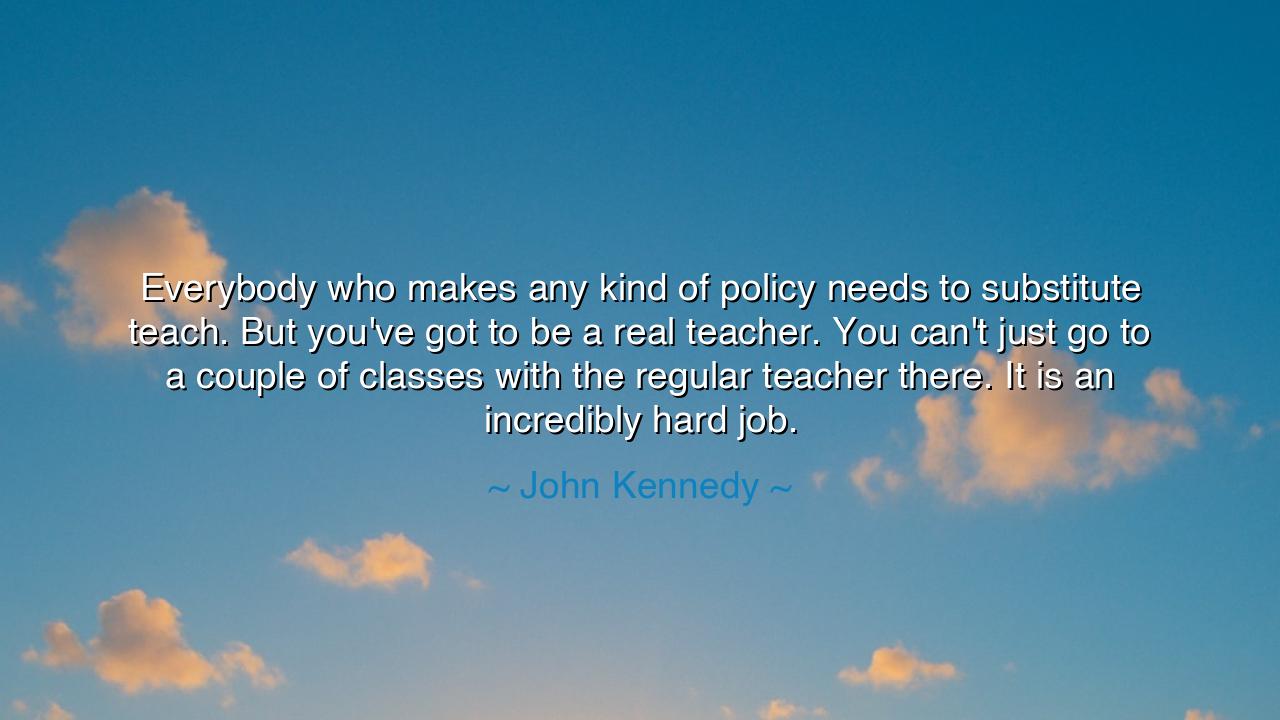
Everybody who makes any kind of policy needs to substitute
Everybody who makes any kind of policy needs to substitute teach. But you've got to be a real teacher. You can't just go to a couple of classes with the regular teacher there. It is an incredibly hard job.






Hearken, children of the ages, and attend to the words of John F. Kennedy, who spoke with insight born of leadership and reflection: "Everybody who makes any kind of policy needs to substitute teach. But you've got to be a real teacher. You can't just go to a couple of classes with the regular teacher there. It is an incredibly hard job." Herein lies a profound lesson upon the bridge between knowledge and action, authority and understanding, and the necessity of experiencing the toil of those whom one governs.
Kennedy’s words reveal that true leadership, especially in crafting policy, demands more than abstract wisdom or theoretical understanding. To govern, to shape laws, or to decree regulations without first walking in the shoes of those affected is to risk ignorance and misjudgment. The role of a teacher—to guide, instruct, and nurture—becomes the ultimate mirror of responsibility. Only by embracing the complexity, patience, and demands of teaching can one truly appreciate the weight of decisions that shape human lives.
Consider the life of Horace Mann, the great reformer of education in the United States. Mann did not simply legislate from afar; he immersed himself in schools, observing, conversing, and understanding the challenges of teachers and students alike. His reforms were informed not merely by theory, but by the lived experience of classrooms, by the recognition that teaching is a profession demanding skill, endurance, and moral commitment. Kennedy echoes this principle: governance, like teaching, cannot be approached superficially.
The call to substitute teach serves as metaphor and practice. To step into a classroom, even temporarily, is to confront the realities of human effort, attention, and growth. It is to feel the strain of guiding minds, maintaining order, inspiring curiosity, and facing the unpredictability of human behavior. Kennedy underscores that only by embracing the genuine hardship of teaching can one craft policies that honor the dignity, needs, and potential of those governed.
Reflect also upon historical leaders who ignored this lesson, ruling with theory and decree alone. Many reforms fail, not for lack of intent, but because the leaders have never endured the hands-on work that informs practical wisdom. Conversely, those who immerse themselves in the lived experience of the people they serve—teachers, workers, soldiers—bring depth, empathy, and effectiveness to their decisions. Kennedy’s insight is timeless: knowledge without experience risks hubris.
The lesson is clear: whether in governance, leadership, or any sphere of influence, one must cultivate empathy, humility, and firsthand understanding. The demands of teaching, with its patience, creativity, and resilience, serve as a crucible for appreciating the human condition. Leaders who grasp the difficulty of guiding and nurturing will be more compassionate, wise, and effective in their policies.
Practical action follows naturally: if you aspire to lead, immerse yourself in the work of those you seek to guide. Spend time in classrooms, factories, fields, or hospitals. Listen to the challenges, observe the dedication required, and let these lessons inform your decisions. Recognize that the hard job of teaching is a reflection of the hardship inherent in life, and that wisdom arises from engagement, not abstraction.
Thus, John F. Kennedy’s words endure as both guidance and admonition: policy without experience is blind; leadership without understanding is hollow. Step into the shoes of those you serve, confront the demands of the real work, and let your decisions flow from insight, empathy, and a profound respect for the labor, patience, and courage that teaching—and life itself—requires.
If you wish, I can also craft a poetic, audio-ready version of this passage, where the rhythm mirrors the intensity and cadence of a classroom, enhancing the emotional resonance of Kennedy’s insight. Do you want me to do that?






AAdministratorAdministrator
Welcome, honored guests. Please leave a comment, we will respond soon